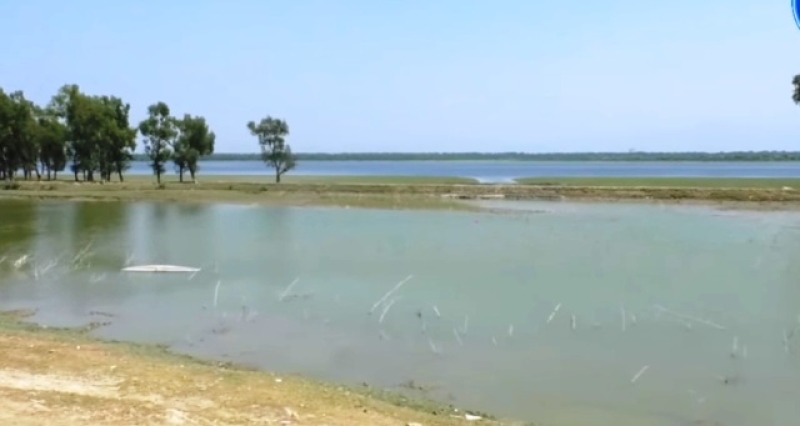- Israel Strikes Tehran with US Support Amid Nuclear Tensions |
- India Sees 9% Drop in Foreign Tourists as Bangladesh Visits Plunge |
- Dhaka Urges Restraint in Pakistan-Afghan War |
- Guterres Urges Action on Safe Migration Pact |
- OpenAI Raises $110B in Amazon-Led Funding |
How Rohingya crisis steals sea from Teknaf’s fishermen

Teknaf overseeing the Bay of Bengal. UNB
Cox’s Bazar, July 31 - In the quiet fishing village of Jaldash Para in Teknaf’s Hnila union, the scent of salt air still lingers, but the sound of oars cutting through the Naf River has long faded.
Where boats once bobbed with fresh catch and laughter rang through narrow lanes, silence now hangs heavy... broken only by the rustle of old fishing nets and whispered conversations about survival.
“Once our village was full of life... the smell of fresh catch, the buzz of trade, and the clatter of nets,” says 70-year-old Samapti Das, her hands deftly weaving fishing gear beside her 96-year-old mother.
“Now, there’s no fish, no buyers, no work. We survive on hope, barely,” he says.
For thousands like Samapti in Teknaf, life changed dramatically in 2017 when over 700,000 Rohingya fled violence and persecution in Myanmar’s Rakhine State, crossing into Bangladesh and turning Cox’s Bazar into the world’s largest refugee settlement.
The humanitarian crisis triggered a wave of global attention, but for Teknaf’s fishing communities, it sparked something else entirely: an indefinite loss of livelihood.
In response to the influx, the government declared the Naf River, once the region’s lifeline, off-limits to local fishermen.
Initially described as a temporary security measure, the ban, now entering its eighth year, has devastated the lives of more than 5,000 fishing families.
The Ministry of Home Affairs, citing concerns over illegal border crossings and smuggling, enforced the restriction with support from Border Guard Bangladesh (BGB).
But while the policy may have aimed to protect borders, it has left an entire community stranded, not in camps, but in poverty.
In bamboo huts and tin-roofed homes, the stories are eerily similar: nets rotting in corners, boats tethered and crumbling, and families unable to afford food or medicine.
Nabi Hossain lies groaning in pain, unable to afford treatment. His wife, Mostofa Khatun, sits beside him, her voice barely a whisper.
“We don’t even have money for paracetamol. Fishing was our only income,” she says.
Not far from their home, Abdul Gani, president of the Jaliapara Small Fishermen’s Cooperative Society, counts more than 200 boats lying idle.
“Our tools are rotting. Our spirit is breaking,” he says.
Once a bustling riverside community, Hnila now bears the weight of uncertainty.
Acting Chairman of Hnila Union Parishad, Ali Ahmed, estimates nearly 5,000 families remain entirely dependent on the river.
“Security is important,” he says, adding, “but what about people?”
His frustration runs deep. “Despite the military presence, border crimes like drug and arms trafficking haven’t stopped. In fact, they’ve grown worse. But the fishermen, the innocents, are the ones who’ve paid the price.”
The human toll is staggering. Children dropping out of school. Kitchens without fire. Illnesses left untreated.
“Hunger gnaws quietly in the shadows,” Ahmed says in sad voice.
In the absence of state support, many families are turning to NGOs or informal moneylenders, piling on debt they cannot repay.
Abu Morshed Chowdhury, President of the Cox’s Bazar Civil Society Forum, believes it's time to reconsider how these communities are treated.
“If we cannot ensure security and livelihood, then these communities must be resettled somewhere safe, where they can work and live with dignity,” he says.
There has been a slight policy shift.
According to Teknaf Upazila Nirbahi Officer (UNO) Sheikh Ehsan Uddin, since August 5, limited fishing is permitted during daytime hours, but only in specific stretches of the river, such as Shahporir Dwip.
“The rest of the river remains restricted for security reasons,” he says.
For the people of Teknaf, it’s a small relief, but not enough. - UNB

